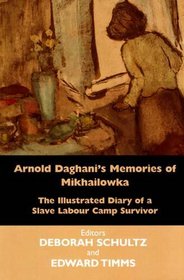Search -
Arnold Daghani's Memories of Mikhailowka: The Illustrated Diary of a Slave Labour Camp Survivor
Arnold Daghani's Memories of Mikhailowka The Illustrated Diary of a Slave Labour Camp Survivor
Author:
The first English book edition of Arnold Daghani's journal, illustrated with watercolours and drawings that he made secretly whilst in captivity. — Arnold Daghani (1909-85) came from a German-speaking Jewish family in Suczawa, then in the Austro-Hungarian Empire, now Romania. His understated narrative of his experiences in the slave labour ca... more »
Author:
The first English book edition of Arnold Daghani's journal, illustrated with watercolours and drawings that he made secretly whilst in captivity. — Arnold Daghani (1909-85) came from a German-speaking Jewish family in Suczawa, then in the Austro-Hungarian Empire, now Romania. His understated narrative of his experiences in the slave labour ca... more »
ISBN-13: 9780853036388
ISBN-10: 0853036381
Publication Date: 2/10/2009
Pages: 243
Rating: ?
ISBN-10: 0853036381
Publication Date: 2/10/2009
Pages: 243
Rating: ?
0 stars, based on 0 rating
Publisher: Mitchell Vallentine & Company
Book Type: Hardcover
Members Wishing: 0
Reviews: Amazon | Write a Review
Book Type: Hardcover
Members Wishing: 0
Reviews: Amazon | Write a Review
Genres:
- Biographies & Memoirs >> Community & Culture >> Jewish
- Biographies & Memoirs >> Historical >> Holocaust
- Biographies & Memoirs >> Memoirs
- History >> Europe >> Ukraine
- History >> Europe >> Romania
- History >> Jewish >> Holocaust




